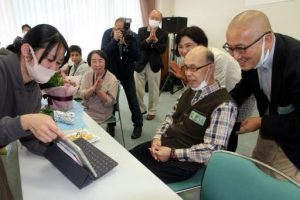At annual meeting in Hiroshima city, Mushroom Club welcomes new member and reports on recent activities
Oct. 19, 2020
by Ryutaro Inoue, Staff Writer
On October 18, the Mushroom Club made up of people with microcephaly and their families, held its annual meeting in Hiroshima’s Higashi Ward. The club’s first new member in 24 years, Shinichi Nakai, 74, from Yokohama City, attended the meeting for the first time. Although only three members with microcephaly participated in the recent meeting due to the coronavirus pandemic, a total of about 40 people, including family and supporters, got together and forged deeper bonds.
In his mother’s womb when she was exposed to the atomic bombing in Hiroshima City, the intellectually disabled Mr. Nakai lives with his 69-year-old sister Yoko. He joined the group in April of last year, after he received a letter from them through the Kanagawa Prefecture government, becoming the first new member since 1995.
Participants celebrated the birthdays of the three microcephaly patients, who all turned 74 this year. They blew out candles on an apple pie and reported to each other about their recent activities, which included the writing of poems. Mr. Nakai, who had looked forward to that day, said with a smile, “I’m happy to be here.” Hiroe Kawashimo, 74, another member, who lives in Higashi Ward, was also pleased. “I was able to catch up with everyone. Besides, now we have a new member,” said Ms. Kawashimo.
Kinoko-kai was founded in 1965. According to the group, 17 people have been recognized as suffering from A-bomb microcephaly by Japan’s national government as of the end of March. Sixteen of them are members of Kinoko-kai, and the parents of all the members are no longer alive. Yoshio Nagaoka, 71, a resident of Asaminami Ward and president of the club, said, “We hope to do what we can to continue helping our members live peaceful lives.”
All meeting participants also offered a silent prayer for Mikiko Yamanouchi, who died this past July at the age of 89. Ms. Yamanouchi was a former employee of the Atomic Bomb Casualty Commission (ABCC) who supported the club’s activities.
(Originally published on October 19, 2020)
On October 18, the Mushroom Club made up of people with microcephaly and their families, held its annual meeting in Hiroshima’s Higashi Ward. The club’s first new member in 24 years, Shinichi Nakai, 74, from Yokohama City, attended the meeting for the first time. Although only three members with microcephaly participated in the recent meeting due to the coronavirus pandemic, a total of about 40 people, including family and supporters, got together and forged deeper bonds.
In his mother’s womb when she was exposed to the atomic bombing in Hiroshima City, the intellectually disabled Mr. Nakai lives with his 69-year-old sister Yoko. He joined the group in April of last year, after he received a letter from them through the Kanagawa Prefecture government, becoming the first new member since 1995.
Participants celebrated the birthdays of the three microcephaly patients, who all turned 74 this year. They blew out candles on an apple pie and reported to each other about their recent activities, which included the writing of poems. Mr. Nakai, who had looked forward to that day, said with a smile, “I’m happy to be here.” Hiroe Kawashimo, 74, another member, who lives in Higashi Ward, was also pleased. “I was able to catch up with everyone. Besides, now we have a new member,” said Ms. Kawashimo.
Kinoko-kai was founded in 1965. According to the group, 17 people have been recognized as suffering from A-bomb microcephaly by Japan’s national government as of the end of March. Sixteen of them are members of Kinoko-kai, and the parents of all the members are no longer alive. Yoshio Nagaoka, 71, a resident of Asaminami Ward and president of the club, said, “We hope to do what we can to continue helping our members live peaceful lives.”
All meeting participants also offered a silent prayer for Mikiko Yamanouchi, who died this past July at the age of 89. Ms. Yamanouchi was a former employee of the Atomic Bomb Casualty Commission (ABCC) who supported the club’s activities.
(Originally published on October 19, 2020)








